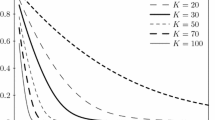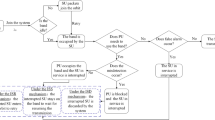Abstract
In usual cognitive radio networks with buffer settings, secondary user packets that are interrupted by primary user packets will return to the SU buffer for later retransmission. But this may increase the average delay of the SU packets. In this paper, we propose a novel spectrum sharing strategy (SSS) to dynamically control the retransmission of the SU packets by introducing a returning threshold and a returning probability. This will simultaneously guarantee the Quality of Service for the SUs. In this SSS, when the transmission of an SU packet is interrupted, if the number of SU packets already in SU buffer reaches a returning threshold that is set in advance as a system parameter, an interrupted SU packet is admitted to return to the SU buffer with a dynamic returning probability. This returning probability is inversely proportional to the total number of packets in the system. Based on the SSS with retransmission control proposed in this paper, we build a discrete-time preemptive priority queueing model to comply with digital nature of modern networks. Accordingly, by presenting and analyzing a two-dimensional discrete-time Markov chain that represents the system state transition, we obtain the steady-state distribution of the system and then provide the formulas for several system performance measures. Moreover, with numerical results, we show the influence of the returning threshold on different performance measures. Finally, by building a net benefit function, we optimize the system performance for the returning threshold to balance different system performance measures.









Similar content being viewed by others
References
Saleem, Y., Rehmani, M.H.: Primary radio user activity models for cognitive radio networks: a survey. J. Netw. Comput. Appl. 43, 1–16 (2014)
Tragos, E., Zeadally, S., Fragkiadakis, A., Siris, V.: Spectrum assignment in cognitive radio networks: a comprehensive survey. IEEE Commun. Surv. Tutor. 15(3), 1108–1135 (2013)
Al-Mahdi, H., Kalil, M., Liers, F., Mitschele-Thiel, A.: Increasing spectrum capacity for Ad Hoc networks using cognitive radios: an analytical model. IEEE Commun. Lett. 13(9), 676–678 (2009)
Turhan, A., Alanyali, M., Starobinski, D.: Optimal admission control of secondary users in preemptive cognitive radio networks. In: Proceedings of 10th International Symposium on Modeling and Optimization in Mobile, Ad Hoc and Wireless Networks, pp. 138–144 (2012)
Lee, Y., Park, C., Sim, D.: Cognitive radio spectrum access with prioritized secondary users. Appl. Math. Inf. Sci. 6(2S), 595S–601S (2012)
Zhang, J., Lu, Y., Gao, X., Zheng, F.: Sensing-then-transmission slot scheduling optimization for opportunistic spectrum access under the interference constraint of primary users. J. Commun. 34(12), 42–48 (2013)
Zhu, D., Choi, B.: Performance analysis of CSMA in an unslotted cognitive radio network with licensed channels and unlicensed channels. EURASIP J. Wirel. Commun. Netw. 2012, 7 (2012), http://jwcn.eurasipjournals.com/content/2012/1/12
Zhao, Y., Jin, S., Yue, W.: A novel spectrum access strategy with \(\alpha \)-retry policy in cognitive radio networks: a queueing-based analysis. J. Commun. Netw. 16(2), 193–201 (2014)
Nguyen-Thanh, N., Pham, A.T., Nguyen, V.: Medium access control design for cognitive radio networks: a survey. IEICE Trans. Commun. E97–B(2), 359–374 (2014)
Naeem, M., Anpalagan, A., Jaseemuddin, M., Lee, D.: Resource allocation techniques in cooperative cognitive radio networks. IEEE Commun. Surv. Tutor. 16(2), 729–744 (2014)
Zhao, Y., Jin, S., Yue, W.: Optimization for cognitive radio channel allocation strategy with access probability and threshold. Pac. J. Optim. 11(1), 157–176 (2015)
Marinho, J., Monteiro, E.: Cognitive radio: survey on communication protocols, spectrum decision issues, and future research directions. Wirel. Netw. 18(2), 147–164 (2012)
Willkomm, D., Wolisz, A.: Efficient QoS support for secondary users in cognitive radio systems. IEEE Wirel. Commun. 17(4), 16–23 (2010)
Zhang, Y., Jiang, T., Zhang, L., Qu, D., Peng, W.: Analysis on the transmission delay of priority-based secondary users in cognitive radio networks. In: Proceedings of International Conference on Wireless Communications & Signal Processing, pp. 1–6 (2013)
Alfa, A.: Queueing Theory for Telecommunications: Discrete Time Modelling of a Single Node System. Springer, New York (2010)
Tian, N., Zhang, Z.: Vacation Queueing Models: Theory and Applications. Springer, New York (2006)
Young, D.: Iterative Solution of Large Linear Systems. Academic Press, New York (1971)
Chong, E., Żak, S.: An Introduction to Optimization, 2nd edn. Wiley, New York (2001)
Jiang, B., Cui, C., Dai, Y.: Unconstrained optimization models for computing several extreme eigenpairs of real symmetric matrices. Pac. J. Optim. 10(1), 55–71 (2014)
Acknowledgements
This work was supported in part by the Fundamental Research Funds for the Central Universities (No. N152303007), the Scientific Research Fund of Hebei Education Department (No. QN2016307), the Natural Science Foundation of Hebei Province (No. F2016501073), the Doctoral Scientific Research Foundation of Liaoning Province (No. 201601016) and the Doctoral Foundation of Northeastern University at Qinhuangdao (No. XNB201606), China, and was supported in part by MEXT, Japan.
Author information
Authors and Affiliations
Corresponding author
Rights and permissions
About this article
Cite this article
Zhao, Y., Yue, W. Performance analysis and optimization of cognitive radio networks with retransmission control. Optim Lett 12, 1281–1300 (2018). https://doi.org/10.1007/s11590-017-1119-8
Received:
Accepted:
Published:
Issue Date:
DOI: https://doi.org/10.1007/s11590-017-1119-8




